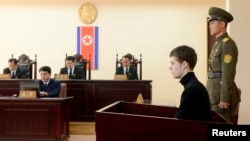The United States has asked North Korea (DPRK) to pardon two Americans sentenced to prison terms, after the conviction of 24-year old Matthew Todd Miller of espionage Sunday. A third detained American also faces trial, and Washington has urged Pyongyang to grant amnesty to all three and allow them to return home.
U.S. spokesman Darby Holladay said the United States has requested North Korea pardon both Miller, who was sentenced to six years hard labor by the Supreme Court Sunday, and 46-year old Kenneth Bae, a Korean-American Christian missionary, who has been held since November 2012. He is serving a 15-year sentence.
Jeffrey Fowle, 56, is awaiting trial for "hostile acts" against the state. Both Miller and Fowle were detained separately in April.
The Associated Press said it was allowed to attend Miller’s 90-minute trial, where the prosecution argued against his alleged request for asylum. He was charged under Article 64 of the criminal code, which is related to espionage.
Friday, U.S. State Department spokeswoman Marie Harf Friday called for amnesty for Miller and the other two detained Americans.
"We have requested the DPRK immediately release him (Miller) and the other detained Americans, so they can return home. As we’ve said, we don’t always publicly outline all of the ways we are working to return our citizens home, but we are very focused on this and have called on the DPRK to release him," said Harf.
Tufts University Korean Studies professor Sung-Yoon Lee said North Korea has engaged in a series of diplomatic meetings, including discussions with U.S. and Japanese officials, in recent weeks, in what he called an encouraging development.
"North Korea’s top man on dealing with the U.S., Kong Sok Ju, is reportedly traveling around Europe and, perhaps, there have been some undeclared, unofficial meetings between the U.S. and North Korea. We know that there was a secret visit to North Korea in August by North Korea policymakers in the Obama administration. So, there are signs, if only brief, of a thaw between North Korea and the U.S., and I think, in that context, the sentencing of this young American will be followed by the release of the Americans and North Korea’s attempt to gain some political and even economic concessions from the U.S.," said Lee.
Lee said North Korea wants to be internationally-recognized as a de facto nuclear state. However, U.S. Special Representative to North Korea Glyn Davies said in July U.S. policy, including sanctions and deterrence, is aimed at a multi-national diplomatic effort to de-nuclearize North Korea.
In February, the North rescinded an invitation for American human rights envoy Robert King to visit for talks on gaining Bae's release. A similar effort was also blocked at the last minute in August 2013.
Bruce Bennett, a North Korea analyst with the RAND Corporation, said Pyongyang may be seeking another high-profile American visit having released detained Americans following trips by former presidents Jimmy Carter in 2010 and Bill Clinton in 2009.
"As far as the North Koreans are concerned, there is no such thing as a former president. All their presidents still serve, even though they’re dead and so, as far as they are concerned, President Clinton was still an American president and, in Asian culture, the weaker leader always goes to the stronger leader and pays his obeisance (deferential respect). I think Kim Jong-un needs that kind of situation now. I think he’s got sufficient instability that he needs the Americans to try to help him out," said Bennett.
Bennett said the North Korean leader appears to be insecure in his position, having sacked four different defense ministers in the past two and a half years, turned over his chief of the general staff three times, and killed his uncle, the former vice chairman of the National Defense Commission, Jang Song-taek.
Two weeks ago, the three detained Americans were allowed to meet with a visiting U.S. television crew and appealed to the United States for their release. The United States says it is doing everything it can to bring the three men back home.
Washington, which has no diplomatic relations with Pyongyang, is represented in North Korea by the embassy of Sweden. Swedish diplomats have met once with Fowle, twice with Miller and 12 times with Bae.




